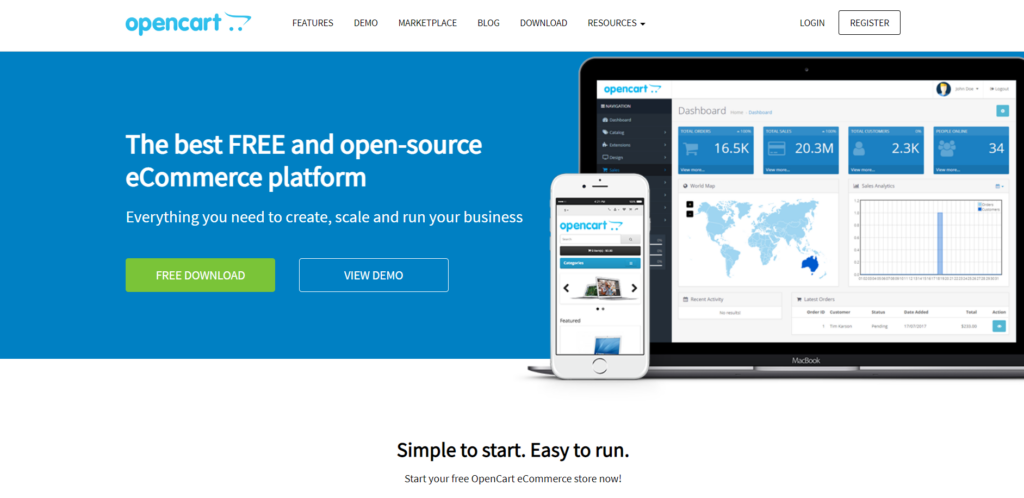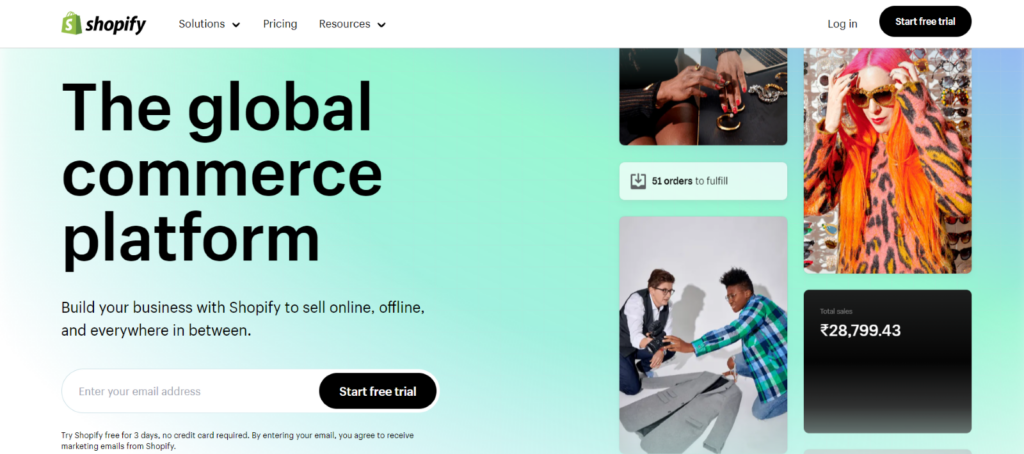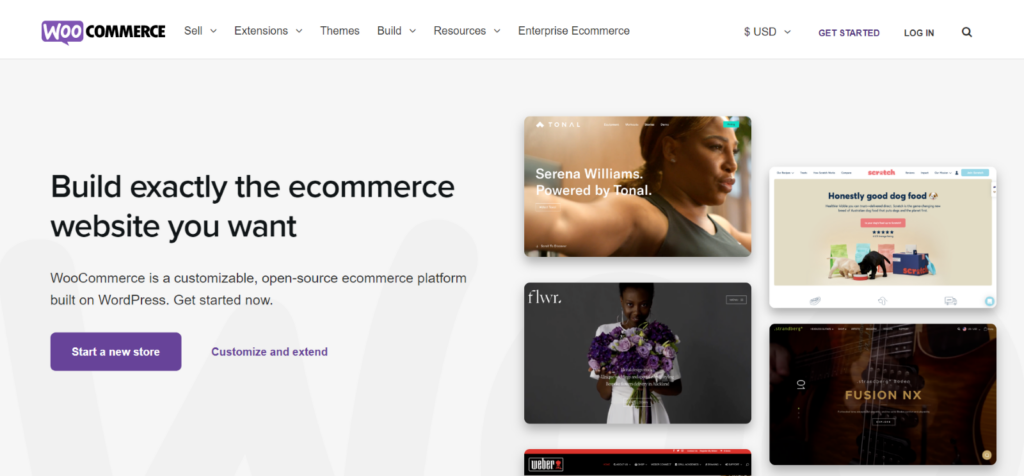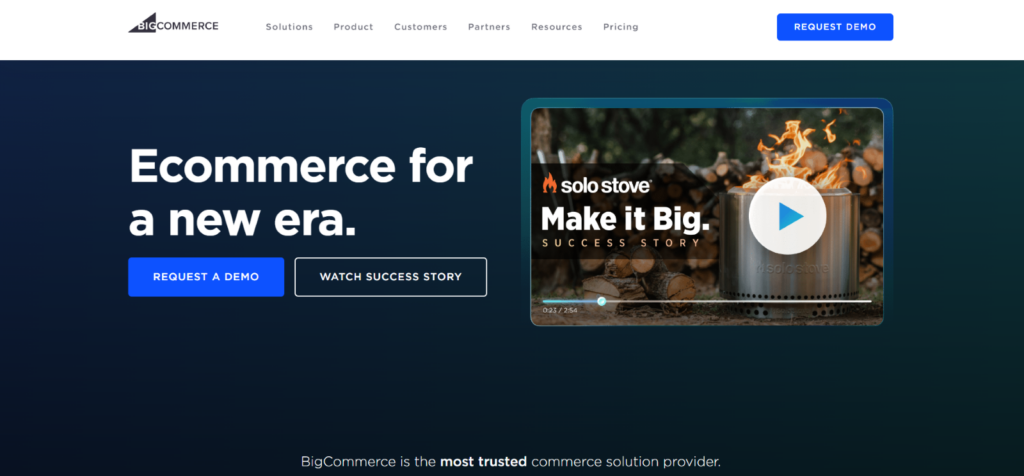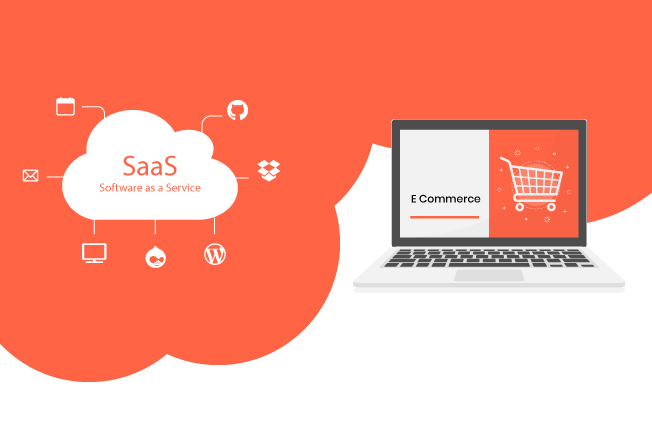
Key Takeaways
- SaaS ecommerce is the practise of selling goods online in collaboration with a SaaS service provider.
- Adobe Commerce, OpenCart, Shopify, and many more are some of the best SaaS e-commerce platforms for businesses looking to create and manage online stores.
- Each platform offers a unique set of features and pricing plans to suit the needs of different businesses.
Are you looking to launch an online store or upgrade your existing ecommerce platform for 2023?
With the world of online shopping constantly evolving, choosing the right SaaS ecommerce platform can make or break your business’s success.
The right platform should be user-friendly, customizable, and equipped with the necessary features to help you sell more products, manage orders, and boost revenue.
To help you make an informed decision, we’ve compiled a list of the top 7 SaaS ecommerce platforms for 2023.
We’ll explore each platform’s features, pricing, and pros and cons, so you can choose the one that best fits your business needs.
So, without further ado, let’s dive in and find the best SaaS ecommerce platform for you!
Best SaaS ecommerce platform-
1. Adobe Commerce
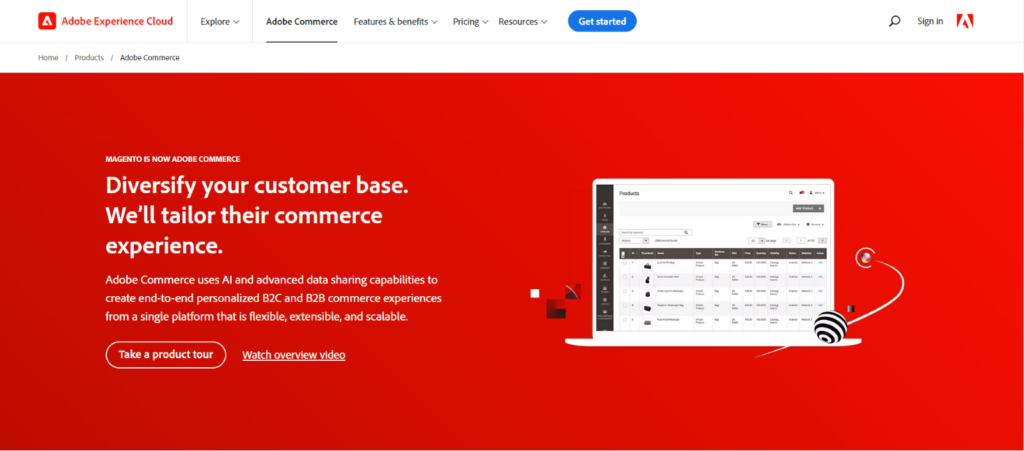
Adobe Commerce is a leading SaaS ecommerce platform known for its flexibility, scalability, and customization options.
Formerly known as Magento commerce, Adobe commerce is a popular choice for mid-sized to large enterprises that require a powerful ecommerce solution.
Key Features of Adobe ecommerce platform:
Page builder: It is a user-friendly page builder that allows merchants to create and customize their online store pages easily, without any technical knowledge.
This feature saves time and makes it easy for users to create a professional-looking website.
Product recommendations: Adobe Commerce’s product recommendation engine uses AI to provide customers with personalized product recommendations based on their browsing and purchase history.
This feature helps ecommerce businesses to increase sales by suggesting products that customers are most likely to be interested in.
Store fulfillment: It provides ecommerce with a complete store fulfillment solution.
It helps manage inventory, order fulfillment, and shipping from a single platform.
They can easily track orders, shipments, manage returns, exchanges, automate shipping and fulfillment processes.
Integrated B2B functionality: It has a built-in B2B functionality that enables merchants to sell to other businesses through a separate B2B storefront.
Ecommerce can manage B2B accounts, set up custom pricing, payment terms, and create complex product catalogs tailored to the needs of their B2B customers.
Payment services: Adobe Commerce offers a range of payment services that ecommerce businesses can use to accept payments from their customers.
The platform supports a variety of payment methods, including credit and debit cards, PayPal, and other popular payment gateways.
Adobe Commerce also includes built-in fraud prevention tools to help ecommerce stores to reduce the risk of payment fraud.
Pricing:
Adobe Commerce offers three pricing plans: Starter, Pro, and Adobe Commerce B2B.
The pricing plans are not publicly disclosed and can vary based on the size and requirements of the business.
However, the platform offers a 30-day free trial, allowing businesses to test the platform before committing to a paid plan.
2. OpenCart:
OpenCart is a cloud-based SaaS ecommerce platform that allows ecommerce businesses to easily set up and manage their online store.
It provides a range of powerful tools and features that enable online store to create a highly customizable online store without any technical knowledge.
Key Features of OpenCart ecommerce platform:
Mobile & SEO: OpenCart has a simple and intuitive interface that makes it easy for businesses to manage their online store.
The platform comes with a range of pre-built templates and themes that allow users to customize the look and feel of their store.
Shipping, Payments & Reports: It provides a rich feature set that includes a variety of tools for managing products, orders, customers, and payments.
The platform offers powerful inventory management and order processing features that enable merchants to streamline their operations and improve their overall efficiency.
Integrations: OpenCart offers seamless integration with a range of third-party tools and services, including payment gateways, shipping providers, and marketing tools.
This enables merchants to extend the functionality of their store and customize it to their specific needs.
Customer support: OpenCart has a large and active community of developers and users who provide support and resources to help ecommerce businesses get the most out of the platform.
The platform also offers extensive documentation and tutorials to help users get started and learn how to use its features.
Pricing:
You can use OpenCart to create your online store for exactly $0 by downloading it.
You’ll never have to pay anything to use this open-source, free software.
Shopify:
Shopify is a leading SaaS ecommerce platform that provides businesses of all sizes with the tools and features needed to create and manage their online stores.
With a wide range of customizable themes and templates, Shopify makes it easy to create a professional-looking online store that reflects your brand and style.
Key features of Shopify’s ecommerce platform:
Customizable Design: Choose from various themes and templates to create a unique and professional-looking online store.
Inventory Management: Easily manage your product catalog, shopify sub collections and track inventory levels to ensure you never run out of stock
Payment Processing: Shopify offers integrated payment processing, allowing you to accept payments from various providers.
Marketing Tools: Shopify includes various marketing tools, including email marketing, social media integration, and SEO optimization features.
Order Processing: Process orders quickly and easily with Shopify’s order management features, including shipping and fulfillment integrations.
App Store: The Shopify App Store offers many add-ons and integrations to help you tailor your eCommerce platform to suit your business needs.
Pricing:
- Basic – $24.13 Per user/ month
- Shopify – $90.10 Per user/ month
- Advanced – $364.95 Per user/ month
WooCommerce:
WooCommerce is one of the world’s most popular content management systems.
It is a flexible, open-source SaaS ecommerce platform built to run on WordPress,
The platform that provides businesses of all sizes with the tools and features needed to create and manage their online stores.
Key features of WooCommerce’s ecommerce platform:
Customizable Design: This feature helps ecommerce businesses to choose from a wide range of themes to create a unique and professional-looking online store that reflects your brand and style.
Product Management: It helps to easily manage your product catalog, track inventory levels, and process orders with WooCommerce’s powerful product management tools.
Payment Processing: WooCommerce integrates with a range of payment providers, allowing eCommerce businesses to accept payments from customers around the world.
Shipping Integrations: Easily manage shipping and fulfillment with WooCommerce’s shipping integrations, including real-time shipping rates and label printing, to ease the process of eCommerce platforms.
Pricing:
The pricing plans are not publicly disclosed and can vary based on the size and requirements of the business.
Bigcommerce:
BigCommerce is a top-rated SaaS ecommerce platform that offers a range of powerful features and tools designed to help businesses of all sizes succeed online.
Key features of Bigcommerce ecommerce platform:
Deliver differentiated commerce experiences: Bigcommerce deliver differentiated dommerce experiences that makes it easy for businesses to create and manage online stores.
You can build and manage web pages, blog entries, and other types of content directly from the platform using a variety of templates that can be tailored to fit your brand.
The platform also has a robust content management system..
Scalable Catalog: With BigCommerce, businesses can easily manage their product catalogs, set pricing and shipping rules, and track inventory levels in real time.
The platform also offers a range of payment and shipping options, enabling businesses to offer a seamless checkout experience to their customers.
Integration with Third-Party Tools: BigCommerce offers a range of integrations with third-party tools and services, including payment gateways, shipping providers, marketing and advertising platforms, and more.
You can connect your store with HubSpot by HubSpot BigCommerce integration and sync your BigCommerce data like Contacts, Orders, and Products over HubSpot CRM
This makes it easy to connect your ecommerce operations with other aspects of your business, allowing you to manage and scale your operations more effectively.
Robust Analytics and Reporting: BigCommerce provides robust analytics and reporting tools that enable businesses to track key metrics such as traffic, sales, and customer behavior.
This data can be used to identify trends and optimize your ecommerce operations for maximum profitability.
Pricing:
- Standard plan: $29 Per user/ month
- Plus plan: $79 Per user/ month
- Pro plan: $299 Per user/ month
Wix:
Wix is one of the most accessible SaaS ecommerce systems, which makes it ideal for new ecommerce stores.
Wix is an affordable alternative that provides just enough capabilities for small sellers to get started but may not be able to scale with rapidly expanding stores due to its many free themes and extremely basic setup.
Key features of the Wix ecommerce platform:
Mobile Friendly: Wix offers a mobile-friendly interface that makes it easy for businesses to create and manage their online stores.
The platform provides a drag-and-drop website builder, allowing businesses to customize their online store’s appearance without needing any technical skills or knowledge.
Customization Options: With Wix, businesses can easily create a unique and visually appealing online presence that stands out.
The platform offers a wide range of templates and themes that can be customized to suit your brand, and businesses can easily add their own custom features and functionality using Wix’s App Market.
Multiple Payment Methods: Wix provides a range of powerful ecommerce features, including the ability to manage product catalogs, inventory, and orders.
The platform supports various payment and shipping options like credit cards, PayPal, offline payments and allowing businesses to offer their customers a seamless checkout experience.
Marketing & social tool: Wix offers a range of marketing & social tools to help businesses drive traffic and sales to their online stores.
This includes social media integrations, email marketing tools, and SEO optimization features.
Analytics and Reporting: Wix provides robust analytics and reporting tools that enable businesses to track key metrics such as traffic, sales, and customer behavior.
This data can be used to identify trends and optimize your ecommerce operations for maximum profitability.
Pricing:
- Connect domain: $0.97Per user/ month
- Combo: $1.52 Per user/ month
- Unlimited: $2.25 Per user/ month
- VIP plan: $3.95 Per user/ month
Salesforce Commerce:
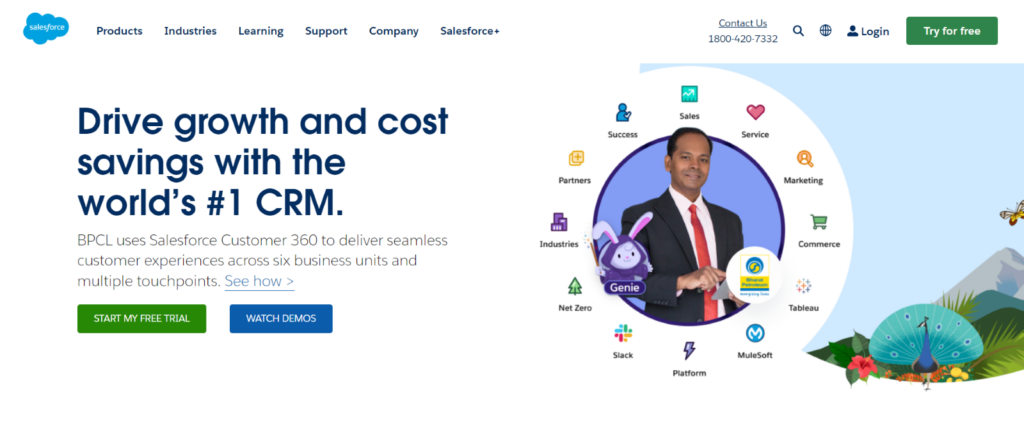
Salesforce Commerce Cloud is a top-tier SaaS ecommerce platform designed for large businesses.
It offers a range of powerful features and tools, making it an excellent choice for enterprises looking to build and grow their eCommerce operations.
Key features of the Salesforce ecommerce platform:
Multi-Channel Selling: With Salesforce Commerce Cloud, businesses can sell their products across multiple channels, including web, mobile, social, and in-store.
This provides a seamless shopping experience for customers, no matter where they choose to shop.
Branded design and easy navigation: The platform offers branded design and easy navigation , allowing businesses to create a unique and visually appealing online store that reflects their brand.
This includes custom landing pages, product pages, and checkout flows.
Powerful Merchandising Tools: It provides a range of powerful merchandising tools that allow businesses to showcase their products and promotions most effectively.
This includes advanced product recommendations, search tools, and targeted promotions.
Order Management: The platform provides a robust order management system that allows businesses to manage orders, payments, and shipping from a single dashboard.
This includes processing orders from multiple channels, tracking inventory levels, and managing returns and exchanges.
Advanced security features: Ecommerce involves transactions in which private financial information is necessarily shared.
The majority of one-touch mobile payments and e-commerce transactions are performed with credit or debit cards, although some may also be conducted straight from bank accounts connected to a payment service like PayPal.
Many ecommerce platforms offer users the opportunity to link their store accounts with personal social media profiles.
Pricing:
- Essential plan: $25 Per user/ month
- Professional plan: $75 Per user/ month
- Enterprise plan: $150 Per user/ month
- Unlimited plan: $300 Per user/ month
Wrapping Up:
The world of ecommerce is constantly evolving, and there are many SaaS ecommerce platforms, to choosing one is challenging. Right?
Each platform has its strengths and weaknesses; the best one for your business will depend on your specific needs and goals.
After reviewing the top 7 SaaS ecommerce platforms, it’s clear that there’s no one-size-fits-all solution.
Instead, it’s essential to carefully consider your business’s needs, sales volume, and potential for future growth when choosing an ecommerce platform.
We hope the list we’ve provided above helps you make an informed decision and select the best ecommerce platform to help your business thrive.
